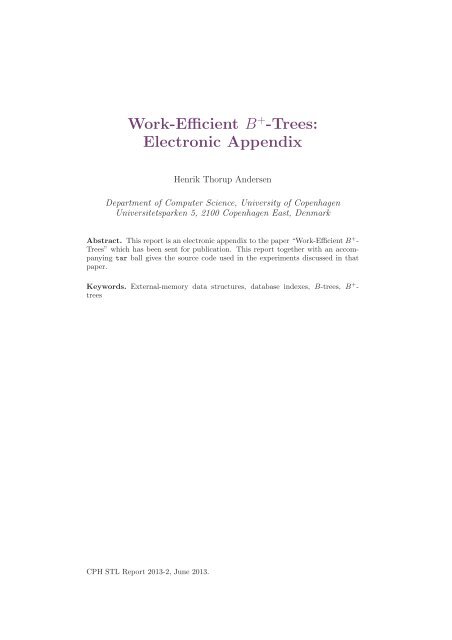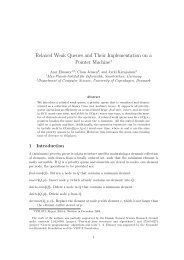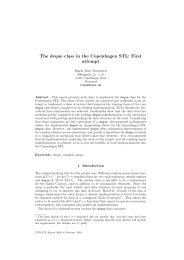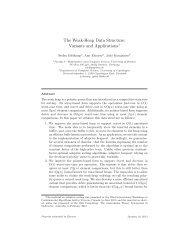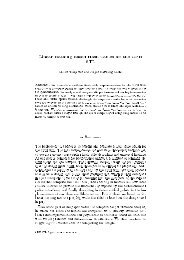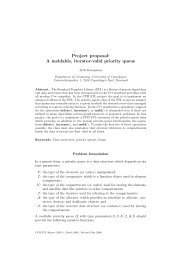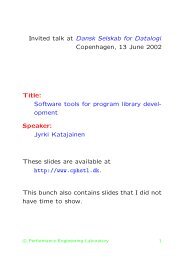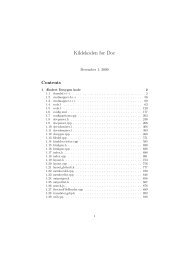Work-Efficient B -Trees: Electronic Appendix - The CPH STL
Work-Efficient B -Trees: Electronic Appendix - The CPH STL
Work-Efficient B -Trees: Electronic Appendix - The CPH STL
Create successful ePaper yourself
Turn your PDF publications into a flip-book with our unique Google optimized e-Paper software.
<strong>Work</strong>-<strong>Efficient</strong> B + -<strong>Trees</strong>:<br />
<strong>Electronic</strong> <strong>Appendix</strong><br />
Henrik Thorup Andersen<br />
Department of Computer Science, University of Copenhagen<br />
Universitetsparken 5, 2100 Copenhagen East, Denmark<br />
Abstract. This report is an electronic appendix to the paper “<strong>Work</strong>-<strong>Efficient</strong> B + -<br />
<strong>Trees</strong>” which has been sent for publication. This report together with an accompanying<br />
tar ball gives the source code used in the experiments discussed in that<br />
paper.<br />
Keywords. External-memory data structures, database indexes, B-trees, B + -<br />
trees<br />
<strong>CPH</strong> <strong>STL</strong> Report 2013-2, June 2013.
Copyright notice<br />
Copyright c○ 2000–2013 by <strong>The</strong> authors and Performance Engineering Laboratory<br />
(University of Copenhagen)<br />
<strong>The</strong> programs included in the <strong>CPH</strong> <strong>STL</strong> are placed in the public domain.<br />
<strong>The</strong> files may be freely copied and distributed, provided that no changes<br />
whatsoever are made. Changes are permissible only if the modified files are<br />
given new names, different from the names of existing files in the <strong>CPH</strong> <strong>STL</strong>,<br />
and only if the modified files are clearly identified as not being part of the<br />
library. Usage of the source code in derived works is otherwise unrestricted.<br />
<strong>The</strong> authors have tried to produce correct and useful programs, but no<br />
warranty of any kind should be assumed.<br />
Release date<br />
2013-06-03<br />
Included files<br />
File<br />
Page<br />
§ 1 improved btree.hpp 3<br />
§ 2 internal rbtree.hpp 21<br />
§ 3 pool.hpp 30
3<br />
B + -tree<br />
§ 1 improved btree.hpp<br />
1 #pragma once<br />
2 #include <br />
3 #include <br />
4 #include <br />
5 #include <br />
6 #include <br />
7 #include ”internal_rbtree.hpp”<br />
8<br />
9 // this class is never instantiated. it has one use: as the template parameter<br />
10 // to an allocator. this way we can use one allocator for both node types<br />
11 template<br />
12 struct alignas(size) allocated_node<br />
13 {<br />
14 uint8_t padding[size];<br />
15 };<br />
16<br />
17 // template parameters:<br />
18 // K: key type<br />
19 // M: mapped type<br />
20 // node size: size of the nodes − should be tuned to page size<br />
21 // address type: type used for addresses − typically uint16 t or uint32 t<br />
22 // compare function: compare function, defaults to std::less<br />
23 // allocator type: a template taking a type, used as allocator<br />
24 template<<br />
25 typename K,<br />
26 typename M,<br />
27 size_t node_size = 512,<br />
28 typename address_type = uint16_t,<br />
29 class compare_function = std::less,<br />
30 class allocator_type = std::allocator><br />
31 class improved_btree<br />
32 {<br />
33 // TYPEDEFS<br />
34 public:<br />
35<br />
36 typedef K key_type;<br />
37 typedef M mapped_type;<br />
38 typedef std::pair value_type;<br />
39<br />
40 // NODEDEFINITIONS<br />
41 private:<br />
42<br />
43 struct alignas(node_size) abstract_node {};<br />
44<br />
45 struct alignas(node_size) inner_node : public abstract_node<br />
46 {<br />
47 typedef internal_rbtree<br />
tree_type;<br />
49<br />
50 tree_type internal_tree;<br />
51 inner_node∗ second;<br />
52<br />
53 inner_node(): second(nullptr) {}<br />
54 };<br />
55<br />
56 struct alignas(node_size) leaf_node : public abstract_node<br />
57 {<br />
58 typedef internal_rbtree
4<br />
tree_type;<br />
60<br />
61 tree_type internal_tree;<br />
62 leaf_node∗ second;<br />
63<br />
64 leaf_node(): second(nullptr) {}<br />
65 };<br />
66<br />
67 // ITERATORTYPE<br />
68 public:<br />
69<br />
70 class iterator<br />
71 {<br />
72 private:<br />
73<br />
74 friend improved_btree;<br />
75<br />
76 iterator(const leaf_node∗ node_, address_type address_)<br />
77 : node(node_), address(address_)<br />
78 {}<br />
79<br />
80 public:<br />
81 iterator()<br />
82 : node(nullptr), address()<br />
83 {}<br />
84<br />
85 const value_type& operator∗()<br />
86 {<br />
87 assert(node != nullptr);<br />
88 return node→internal_tree.pool[address].value;<br />
89 }<br />
90<br />
91 const value_type∗ operator→()<br />
92 {<br />
93 assert(node != nullptr);<br />
94 return &node→internal_tree.pool[address].value;<br />
95 }<br />
96<br />
97 // TODO: increment and decrement<br />
98<br />
99 private:<br />
100 const leaf_node∗ node;<br />
101 address_type address;<br />
102 };<br />
103<br />
104 // DATAMEMBERS<br />
105 private:<br />
106<br />
107 abstract_node∗ root;<br />
108 unsigned height;<br />
109<br />
110 allocator_type allocator;<br />
111<br />
112 // ALLOCATORWRAPPERS<br />
113 private:<br />
114<br />
115 inner_node∗ allocate_inner()<br />
116 { return (inner_node∗)(allocator.allocate(1)); }<br />
117<br />
118 leaf_node∗ allocate_leaf()<br />
119 { return (leaf_node∗)(allocator.allocate(1)); }<br />
120<br />
121 void deallocate_inner(inner_node∗ node)<br />
122 { allocator.deallocate((allocated_node∗)node, 1); }<br />
123
5<br />
124 void deallocate_leaf(leaf_node∗ node)<br />
125 { allocator.deallocate((allocated_node∗)node, 1); }<br />
126<br />
127 // CONSTRUCTORSETCETERA<br />
128 public:<br />
129<br />
130 improved_btree()<br />
131 : height(0)<br />
132 {<br />
133 root = allocate_leaf();<br />
134 new (root) leaf_node();<br />
135 }<br />
136<br />
137 ∼improved_btree()<br />
138 {<br />
139 destruct(root, height);<br />
140 }<br />
141<br />
142 // TODO: copying<br />
143 improved_btree(improved_btree&) = delete;<br />
144 void operator=(improved_btree&) = delete;<br />
145<br />
146 private:<br />
147<br />
148 void destruct(abstract_node∗ node, const unsigned level)<br />
149 {<br />
150 if (level != 0)<br />
151 { destruct(static cast(node), level); }<br />
152 else<br />
153 { destruct(static cast(node)); }<br />
154 }<br />
155<br />
156 void destruct(inner_node∗ node, const unsigned level)<br />
157 {<br />
158 if (node→second != nullptr)<br />
159 {<br />
160 auto x = node→second→internal_tree.min_address();<br />
161 while (x != node→second→internal_tree.max_address())<br />
162 {<br />
163 destruct(node→second→internal_tree.pool[x].<br />
value.second,<br />
164 level−1);<br />
165 x = node→second→internal_tree.successor(x);<br />
166 }<br />
167 destruct(node→second→internal_tree.pool[x].value.second<br />
,<br />
168 level−1);<br />
169<br />
170 deallocate_inner(node→second);<br />
171 }<br />
172<br />
173 auto x = node→internal_tree.min_address();<br />
174 while (x != node→internal_tree.max_address())<br />
175 {<br />
176 destruct(node→internal_tree.pool[x].value.second,<br />
177 level−1);<br />
178 x = node→internal_tree.successor(x);<br />
179 }<br />
180 destruct(node→internal_tree.pool[x].value.second,<br />
181 level−1);<br />
182<br />
183 deallocate_inner(node);<br />
184 }<br />
185<br />
186 void destruct(leaf_node∗ node)
6<br />
187 {<br />
188 if (node→second != nullptr)<br />
189 { deallocate_leaf(node→second); }<br />
190<br />
191 deallocate_leaf(node);<br />
192 }<br />
193<br />
194 // FIND<br />
195 public:<br />
196<br />
197 // returns the largest value that is less than or equal to the key given,<br />
198 // or, if all values are larger than the key, returns the minimum value<br />
199 // todo: implement iterators<br />
200 iterator find(const key_type& k) const<br />
201 {<br />
202 unsigned level = height;<br />
203 const abstract_node∗ current_node = root;<br />
204<br />
205 // search inner nodes<br />
206 while (level != 0)<br />
207 {<br />
208 const inner_node∗ first = static cast(<br />
current_node);<br />
209 const inner_node∗ second = first→second;<br />
210<br />
211 if (second != nullptr and<br />
212 not compare_function()(k, min_key(second)))<br />
213 {<br />
214 current_node =<br />
215 second→internal_tree.pool[<br />
216 second→internal_tree.lookup(k)].<br />
value.second;<br />
217 }<br />
218 else<br />
219 {<br />
220 current_node =<br />
221 first→internal_tree.pool[<br />
222 first→internal_tree.lookup(k)].<br />
value.second;<br />
223 }<br />
224<br />
225 −−level;<br />
226 }<br />
227<br />
228 // get the result from the leaf<br />
229 const leaf_node∗ first = static cast(<br />
current_node);<br />
230 const leaf_node∗ second = first→second;<br />
231<br />
232 if (second != nullptr and not compare_function()(k, min_key(<br />
second)))<br />
233 {<br />
234 return iterator(second, second→internal_tree.lookup(k));<br />
235 }<br />
236 else<br />
237 {<br />
238 return iterator(first, first→internal_tree.lookup(k));<br />
239 }<br />
240 }<br />
241<br />
242 // INSERT<br />
243 public:<br />
244<br />
245 void insert(const value_type& v)<br />
246 {
7<br />
247 // if the root is full , split it and make a new one<br />
248 if (is_full(root, height))<br />
249 { split_root(); }<br />
250<br />
251 unsigned level = height;<br />
252 abstract_node∗ current_node = root;<br />
253<br />
254 // search inner nodes<br />
255 while (level != 0)<br />
256 {<br />
257 inner_node∗ first = static cast(current_node<br />
);<br />
258 inner_node∗ second = first→second;<br />
259<br />
260 current_node = insert_inner(first, second, level, v);<br />
261 −−level;<br />
262 }<br />
263<br />
264 // insert to the leaf<br />
265 leaf_node∗ first = static cast(current_node);<br />
266 leaf_node∗ second = first→second;<br />
267<br />
268 return insert_leaf(first, second, v);<br />
269 }<br />
270<br />
271 private:<br />
272<br />
273 abstract_node∗ insert_inner(inner_node∗ first, inner_node∗ second,<br />
274 const unsigned level, const value_type& v)<br />
275 {<br />
276 // preconditions:<br />
277 assert(not is_full(first));<br />
278<br />
279 // second page exists and the value belongs in it<br />
280 if (second != nullptr and<br />
281 not compare_function()(v.first, min_key(second)))<br />
282 {<br />
283 // find the child to insert to<br />
284 auto insert_to_address = second→internal_tree.lookup(v.<br />
first);<br />
285<br />
286 abstract_node∗ insert_to = second→internal_tree.pool[<br />
287 insert_to_address].value.second;<br />
288<br />
289 // is it full<br />
290 if (is_full(insert_to, level−1))<br />
291 {<br />
292 // split it<br />
293 abstract_node∗ splitted = split(insert_to, level−<br />
1);<br />
294 auto min_key_splitted = min_key(splitted, level−<br />
1);<br />
295<br />
296 // create an element representing the new node<br />
297 second→internal_tree.insert(<br />
298 {min_key_splitted, splitted});<br />
299<br />
300 // decide which of the resulting nodes to insert<br />
to<br />
301 insert_to = not compare_function()(v.first,<br />
min_key_splitted)<br />
302 splitted : insert_to;<br />
303 }<br />
304<br />
305 return insert_to;
8<br />
306 }<br />
307 // second page doesn’t exist or the value doesn’t belong in it<br />
308 else<br />
309 {<br />
310 // find the child to insert to<br />
311 auto insert_to_address = first→internal_tree.lookup(v.<br />
first);<br />
312<br />
313 abstract_node∗ insert_to = first→internal_tree.pool[<br />
314 insert_to_address].value.second;<br />
315<br />
316 // is it full<br />
317 if (is_full(insert_to, level−1))<br />
318 {<br />
319 // split it<br />
320 abstract_node∗ splitted = split(insert_to, level−<br />
1);<br />
321 auto min_key_splitted = min_key(splitted, level−<br />
1);<br />
322<br />
323 // find space for an element representing the new<br />
node<br />
324 // is this page full<br />
325 if (first→internal_tree.full())<br />
326 {<br />
327 second = create_second_if_needed(first);<br />
328<br />
329 // if the child is the maximum, the<br />
result of the split<br />
330 // will go into the second node<br />
331 if (insert_to_address == first→<br />
internal_tree.max_address())<br />
332 {<br />
333 second→internal_tree.insert_min<br />
({<br />
334 min_key_splitted,<br />
splitted});<br />
335 }<br />
336 // otherwise, the maximum will go into<br />
the second node<br />
337 else<br />
338 {<br />
339 move_from_first_to_second(first);<br />
340<br />
341 first→internal_tree.insert(<br />
342 {min_key_splitted,<br />
splitted});<br />
343 }<br />
344 }<br />
345 // this node isn’t full<br />
346 else<br />
347 {<br />
348 first→internal_tree.insert(<br />
349 {min_key_splitted, splitted});<br />
350 }<br />
351<br />
352 // decide which of the resulting nodes to insert<br />
to<br />
353 insert_to = not compare_function()(v.first,<br />
min_key_splitted)<br />
354 splitted : insert_to;<br />
355 }<br />
356<br />
357 // because any keys less than the leftmost key are<br />
inserted into
9<br />
358 // the leftmost node − the node corresponding to the<br />
leftmost key<br />
359 // (we do not have an extra node like in a regular btree)<br />
− we<br />
360 // might need to update the key of the node we are<br />
inserting to.<br />
361 // we can do it in this way because we know that the<br />
ordering does<br />
362 // not change<br />
363 if (compare_function()(v.first, first→internal_tree.pool<br />
[<br />
364 insert_to_address].value.first))<br />
365 {<br />
366 first→internal_tree.change_key_of_element(<br />
367 insert_to_address, v.first);<br />
368 }<br />
369<br />
370 return insert_to;<br />
371 }<br />
372 }<br />
373<br />
374 void insert_leaf(leaf_node∗ first, leaf_node∗ second,<br />
375 const value_type& v)<br />
376 {<br />
377 // preconditions:<br />
378 assert(not is_full(first));<br />
379<br />
380 // second node exists and the value belongs in it<br />
381 if (second != nullptr and<br />
382 not compare_function()(v.first, min_key(second)))<br />
383 {<br />
384 // simple case: just insert<br />
385 second→internal_tree.insert(v);<br />
386 }<br />
387 // second node doesn’t exist or the value doesn’t belong in it<br />
388 else<br />
389 {<br />
390 // is this node full<br />
391 if (first→internal_tree.full())<br />
392 {<br />
393 // slightly more complicated case:<br />
394<br />
395 // one of two values have to go into the second<br />
node: either the<br />
396 // new value or the current maximum, depending on<br />
which will be<br />
397 // the new maximum<br />
398 auto max_key_first = max_key(first);<br />
399 if (compare_function()(max_key_first, v.first))<br />
400 {<br />
401 // if the second node doesn’t exist , we<br />
need to allocate it<br />
402 second = create_second_if_needed(first);<br />
403<br />
404 // the new value is larger and is placed<br />
in the second node<br />
405 second→internal_tree.insert(v);<br />
406 return;<br />
407 }<br />
408 else if (compare_function()(v.first,<br />
max_key_first))<br />
409 {<br />
410 move_from_first_to_second(first);<br />
411 // and the new value is placed in this<br />
node
10<br />
412 }<br />
413 // edge case: the new value has the same key as<br />
the current<br />
414 // maximum. in this case we just replace, which<br />
the<br />
415 // internal tree insert function handles<br />
416 }<br />
417 // this node isn’t full<br />
418 // simple case: just insert<br />
419 first→internal_tree.insert(v);<br />
420 }<br />
421 }<br />
422<br />
423 // ERASE<br />
424 public:<br />
425<br />
426 void erase(const key_type& k)<br />
427 {<br />
428 // check for collapse: root is inner node and has only one<br />
element<br />
429 // (that is, minimum is the same as maximum)<br />
430 if (height > 0 and<br />
431 static cast(root)→internal_tree.min_address<br />
() ==<br />
432 static cast(root)→internal_tree.max_address<br />
())<br />
433 {<br />
434 inner_node∗ root_inner = static cast(root);<br />
435 root = root_inner→internal_tree.pool[<br />
436 root_inner→internal_tree.min_address()].value.<br />
second;<br />
437 −−height;<br />
438 }<br />
439<br />
440 unsigned level = height;<br />
441 abstract_node∗ current_node = root;<br />
442<br />
443 // search inner nodes<br />
444 while (level != 0)<br />
445 {<br />
446 inner_node∗ first = static cast(current_node<br />
);<br />
447 inner_node∗ second = first→second;<br />
448<br />
449 current_node = erase_inner(first, second, level, k);<br />
450 level −= 1;<br />
451 }<br />
452<br />
453 // erase from the leaf<br />
454 leaf_node∗ first = static cast(current_node);<br />
455 leaf_node∗ second = first→second;<br />
456<br />
457 return erase_leaf(first, second, k);<br />
458 }<br />
459<br />
460 private:<br />
461<br />
462 abstract_node∗ erase_inner(inner_node∗ first, inner_node∗ second,<br />
463 const unsigned level, const key_type& k)<br />
464 {<br />
465 // preconditions:<br />
466 assert(first == root or not is_small(first));<br />
467<br />
468 address_type erase_from_address;<br />
469 abstract_node∗ erase_from;
11<br />
470<br />
471 // addresses of adjacent nodes<br />
472 bool has_left = false;<br />
473 address_type adjacent_left_address;<br />
474 abstract_node∗ adjacent_left;<br />
475<br />
476 bool has_right = false;<br />
477 address_type adjacent_right_address;<br />
478 abstract_node∗ adjacent_right;<br />
479<br />
480 // find the node to erase from<br />
481 if (second != nullptr and not compare_function()(k, min_key(<br />
second)))<br />
482 {<br />
483 erase_from_address = second→internal_tree.lookup(k);<br />
484 erase_from = second→internal_tree.pool[<br />
485 erase_from_address].value.second;<br />
486<br />
487 if (is_small(erase_from, level−1))<br />
488 {<br />
489 if (erase_from_address == second→internal_tree.<br />
min_address())<br />
490 {<br />
491 adjacent_left_address = first→<br />
internal_tree.max_address();<br />
492 adjacent_left = first→internal_tree.pool<br />
[<br />
493 adjacent_left_address].value.<br />
second;<br />
494 }<br />
495 else<br />
496 {<br />
497 adjacent_left_address =<br />
498 second→internal_tree.predecessor<br />
(erase_from_address);<br />
499 adjacent_left = second→internal_tree.<br />
pool[<br />
500 adjacent_left_address].value.<br />
second;<br />
501 }<br />
502<br />
503 if (erase_from_address != second→internal_tree.<br />
max_address())<br />
504 {<br />
505 has_right = true;<br />
506 adjacent_right_address =<br />
507 second→internal_tree.successor(<br />
erase_from_address);<br />
508 adjacent_right = second→internal_tree.<br />
pool[<br />
509 adjacent_right_address].value.<br />
second;<br />
510 }<br />
511<br />
512 // can we steal from the node to the left<br />
513 if (not is_small(adjacent_left, level−1))<br />
514 {<br />
515 steal_from_left_to_right(<br />
516 adjacent_left, erase_from, level−<br />
1);<br />
517<br />
518 // update the key of the node we stole to<br />
. we can do it like<br />
519 // this because we know that the ordering<br />
has not changed
12<br />
520 second→internal_tree.<br />
change_key_of_element(<br />
521 erase_from_address, min_key(<br />
erase_from, level−1));<br />
522 }<br />
523 // can we steal from the node to the right<br />
524 else if (has_right and not is_small(<br />
525 adjacent_right, level−1))<br />
526 {<br />
527 steal_from_right_to_left(<br />
528 erase_from, adjacent_right, level<br />
−1);<br />
529<br />
530 // update the key of the node we stole<br />
from. we can do it<br />
531 // like this because we know that the<br />
ordering has not<br />
532 // changed<br />
533 second→internal_tree.<br />
change_key_of_element(<br />
534 adjacent_right_address, min_key(<br />
535 adjacent_right, level−1))<br />
;<br />
536 }<br />
537 // merge with the node to the left<br />
538 else<br />
539 {<br />
540 merge(adjacent_left, erase_from, level−1)<br />
;<br />
541<br />
542 second→internal_tree.erase_address(<br />
erase_from_address);<br />
543 delete_second_if_empty(first);<br />
544<br />
545 erase_from = adjacent_left;<br />
546 }<br />
547 }<br />
548 return erase_from;<br />
549 }<br />
550 else<br />
551 {<br />
552 erase_from_address = first→internal_tree.lookup(k);<br />
553 erase_from = first→internal_tree.pool[<br />
554 erase_from_address].value.second;<br />
555<br />
556 if (is_small(erase_from, level−1))<br />
557 {<br />
558 bool adjacent_right_from_second;<br />
559<br />
560 if (erase_from_address != first→internal_tree.<br />
min_address())<br />
561 {<br />
562 has_left = true;<br />
563 adjacent_left_address =<br />
564 first→internal_tree.predecessor(<br />
erase_from_address);<br />
565 adjacent_left = first→internal_tree.pool<br />
[<br />
566 adjacent_left_address].value.<br />
second;<br />
567 }<br />
568<br />
569 if (second != nullptr and<br />
570 erase_from_address == first→<br />
internal_tree.max_address())
13<br />
571 {<br />
572 has_right = true;<br />
573 adjacent_right_address =<br />
574 second→internal_tree.min_address<br />
();<br />
575 adjacent_right = second→internal_tree.<br />
pool[<br />
576 adjacent_right_address].value.<br />
second;<br />
577 adjacent_right_from_second = true;<br />
578 }<br />
579 else if (erase_from_address !=<br />
580 first→internal_tree.max_address())<br />
581 {<br />
582 has_right = true;<br />
583 adjacent_right_address =<br />
584 first→internal_tree.successor(<br />
erase_from_address);<br />
585 adjacent_right = first→internal_tree.<br />
pool[<br />
586 adjacent_right_address].value.<br />
second;<br />
587 adjacent_right_from_second = false;<br />
588 }<br />
589<br />
590 // can we steal from the node to the left<br />
591 if (has_left and not is_small(adjacent_left,<br />
level−1))<br />
592 {<br />
593 steal_from_left_to_right(<br />
594 adjacent_left, erase_from, level−<br />
1);<br />
595<br />
596 // update the key of the node we stole to<br />
. we can do it like<br />
597 // this because we know that the ordering<br />
has not changed<br />
598 first→internal_tree.<br />
change_key_of_element(<br />
599 erase_from_address, min_key(<br />
erase_from, level−1));<br />
600 }<br />
601 // can we steal from the node to the right<br />
602 else if (has_right and not is_small(<br />
603 adjacent_right, level−1))<br />
604 {<br />
605 steal_from_right_to_left(<br />
606 erase_from, adjacent_right, level<br />
−1);<br />
607<br />
608 // update the key of the node we stole<br />
from. we can do it<br />
609 // like this because we know that the<br />
ordering has not<br />
610 // changed<br />
611 if (adjacent_right_from_second)<br />
612 {<br />
613 second→internal_tree.<br />
change_key_of_element(<br />
614 adjacent_right_address,<br />
615 min_key(adjacent_right,<br />
level−1));<br />
616 }<br />
617 else<br />
618 {
14<br />
619 first→internal_tree.<br />
change_key_of_element(<br />
620 adjacent_right_address,<br />
621 min_key(adjacent_right,<br />
level−1));<br />
622 }<br />
623 }<br />
624 // can we merge with the node to the left<br />
625 else if (has_left)<br />
626 {<br />
627 merge(adjacent_left, erase_from, level−1)<br />
;<br />
628<br />
629 // erase the merged node<br />
630 first→internal_tree.erase_address(<br />
erase_from_address);<br />
631 move_from_second_to_first(first);<br />
632<br />
633 erase_from = adjacent_left;<br />
634 }<br />
635 // last resort, merge with the node to the right<br />
636 else<br />
637 {<br />
638 merge(erase_from, adjacent_right, level−<br />
1);<br />
639<br />
640 // erase the merged node<br />
641 if (adjacent_right_from_second)<br />
642 {<br />
643 second→internal_tree.<br />
erase_address(<br />
644 adjacent_right_address);<br />
645 delete_second_if_empty(first);<br />
646 }<br />
647 else<br />
648 {<br />
649 first→internal_tree.<br />
erase_address(<br />
650 adjacent_right_address);<br />
651 move_from_second_to_first(first);<br />
652 }<br />
653 }<br />
654 }<br />
655 return erase_from;<br />
656 }<br />
657 }<br />
658<br />
659 void erase_leaf(leaf_node∗ first, leaf_node∗ second,<br />
660 const key_type& k)<br />
661 {<br />
662 // preconditions:<br />
663 assert(first == root or not is_small(first));<br />
664<br />
665 if (second != nullptr and not compare_function()(k, min_key(<br />
second)))<br />
666 {<br />
667 second→internal_tree.erase(k);<br />
668 delete_second_if_empty(first);<br />
669 }<br />
670 else<br />
671 {<br />
672 first→internal_tree.erase(k);<br />
673 if (not first→internal_tree.full())<br />
674 { move_from_second_to_first(first); }<br />
675 }
15<br />
676 }<br />
677<br />
678 // SPLITROOT<br />
679 // this handles splitting a root node into two and creating a new root<br />
680 // with these as children. it returns a pointer to the new root. this is<br />
681 // the only way that the tree grows in height<br />
682 private:<br />
683<br />
684 void split_root()<br />
685 {<br />
686 abstract_node∗ splitted = split(root, height);<br />
687<br />
688 inner_node∗ new_root = allocate_inner();<br />
689 new (new_root) inner_node();<br />
690<br />
691 new_root→internal_tree.insert(<br />
692 std::make_pair(min_key(root, height), root));<br />
693 new_root→internal_tree.insert(<br />
694 std::make_pair(min_key(splitted, height), splitted));<br />
695<br />
696 root = new_root;<br />
697 height += 1;<br />
698 }<br />
699<br />
700 // SPLIT<br />
701 private:<br />
702<br />
703 abstract_node∗ split(abstract_node∗ node, const unsigned level)<br />
704 {<br />
705 if (level != 0)<br />
706 { return split(static cast(node)); }<br />
707 else<br />
708 { return split(static cast(node)); }<br />
709 }<br />
710<br />
711 abstract_node∗ split(inner_node∗ node)<br />
712 {<br />
713 // preconditions:<br />
714 assert(is_full(node));<br />
715<br />
716 auto splitted = node→second;<br />
717 node→second = nullptr;<br />
718 return splitted;<br />
719 }<br />
720<br />
721 abstract_node∗ split(leaf_node∗ node)<br />
722 {<br />
723 // preconditions:<br />
724 assert(is_full(node));<br />
725<br />
726 auto splitted = node→second;<br />
727 node→second = nullptr;<br />
728 return splitted;<br />
729 }<br />
730<br />
731 // STEALFROMLEFTTORIGHT<br />
732 private:<br />
733<br />
734 void steal_from_left_to_right(abstract_node∗ left, abstract_node∗ right,<br />
735 const unsigned level)<br />
736 {<br />
737 if (level != 0)<br />
738 {<br />
739 steal_from_left_to_right(<br />
740 static cast(left),
16<br />
741 static cast(right));<br />
742 }<br />
743 else<br />
744 {<br />
745 steal_from_left_to_right(<br />
746 static cast(left),<br />
747 static cast(right));<br />
748 }<br />
749 }<br />
750<br />
751 void steal_from_left_to_right(inner_node∗ left, inner_node∗ right)<br />
752 {<br />
753 // preconditions:<br />
754 assert(is_small(right));<br />
755 assert(not is_small(left));<br />
756<br />
757 move_from_first_to_second(right);<br />
758<br />
759 auto to_steal_address = left→second→internal_tree.max_address()<br />
;<br />
760 auto& to_steal = left→second→internal_tree.pool[<br />
761 to_steal_address].value;<br />
762<br />
763 right→internal_tree.insert(to_steal);<br />
764 left→second→internal_tree.erase_address(to_steal_address);<br />
765 delete_second_if_empty(left);<br />
766 }<br />
767<br />
768 void steal_from_left_to_right(leaf_node∗ left, leaf_node∗ right)<br />
769 {<br />
770 // preconditions:<br />
771 assert(is_small(right));<br />
772 assert(not is_small(left));<br />
773<br />
774 move_from_first_to_second(right);<br />
775<br />
776 auto to_steal_address = left→second→internal_tree.max_address()<br />
;<br />
777 auto& to_steal = left→second→internal_tree.pool[<br />
778 to_steal_address].value;<br />
779<br />
780 right→internal_tree.insert(to_steal);<br />
781 left→second→internal_tree.erase_address(to_steal_address);<br />
782 delete_second_if_empty(left);<br />
783 }<br />
784<br />
785 // STEALFROMRIGHTTOLEFT<br />
786 private:<br />
787<br />
788 void steal_from_right_to_left(abstract_node∗ left, abstract_node∗ right,<br />
789 const unsigned level)<br />
790 {<br />
791 if (level != 0)<br />
792 {<br />
793 steal_from_right_to_left(<br />
794 static cast(left),<br />
795 static cast(right));<br />
796 }<br />
797 else<br />
798 {<br />
799 steal_from_right_to_left(<br />
800 static cast(left),<br />
801 static cast(right));<br />
802 }<br />
803 }
17<br />
804<br />
805 void steal_from_right_to_left(inner_node∗ left, inner_node∗ right)<br />
806 {<br />
807 // preconditions:<br />
808 assert(is_small(left));<br />
809 assert(not is_small(right));<br />
810<br />
811 create_second_if_needed(left);<br />
812<br />
813 auto to_steal_address = right→internal_tree.min_address();<br />
814 auto& to_steal = right→internal_tree.pool[<br />
815 to_steal_address].value;<br />
816<br />
817 left→second→internal_tree.insert(to_steal);<br />
818 right→internal_tree.erase_address(to_steal_address);<br />
819 move_from_second_to_first(right);<br />
820 }<br />
821<br />
822 void steal_from_right_to_left(leaf_node∗ left, leaf_node∗ right)<br />
823 {<br />
824 // preconditions:<br />
825 assert(is_small(left));<br />
826 assert(not is_small(right));<br />
827<br />
828 create_second_if_needed(left);<br />
829<br />
830 auto to_steal_address = right→internal_tree.min_address();<br />
831 auto& to_steal = right→internal_tree.pool[<br />
832 to_steal_address].value;<br />
833<br />
834 left→second→internal_tree.insert(to_steal);<br />
835 right→internal_tree.erase_address(to_steal_address);<br />
836 move_from_second_to_first(right);<br />
837 }<br />
838<br />
839 // MERGE<br />
840 private:<br />
841<br />
842 void merge(abstract_node∗ left, abstract_node∗ right, const unsigned<br />
level)<br />
843 {<br />
844 if (level != 0)<br />
845 {<br />
846 merge(<br />
847 static cast(left),<br />
848 static cast(right));<br />
849 }<br />
850 else<br />
851 {<br />
852 merge(<br />
853 static cast(left),<br />
854 static cast(right));<br />
855 }<br />
856 }<br />
857<br />
858 void merge(inner_node∗ left, inner_node∗ right)<br />
859 {<br />
860 // preconditions:<br />
861 assert(is_small(left));<br />
862 assert(is_small(right));<br />
863<br />
864 left→second = right;<br />
865 }<br />
866<br />
867 void merge(leaf_node∗ left, leaf_node∗ right)
18<br />
868 {<br />
869 // preconditions:<br />
870 assert(is_small(left));<br />
871 assert(is_small(right));<br />
872<br />
873 left→second = right;<br />
874 }<br />
875<br />
876 // CREATESECOND IF NEEDED<br />
877 private:<br />
878<br />
879 inner_node∗ create_second_if_needed(inner_node∗ node)<br />
880 {<br />
881 if (node→second == nullptr)<br />
882 {<br />
883 node→second = allocate_inner();<br />
884 new (node→second) inner_node();<br />
885 }<br />
886 return node→second;<br />
887 }<br />
888<br />
889 leaf_node∗ create_second_if_needed(leaf_node∗ node)<br />
890 {<br />
891 if (node→second == nullptr)<br />
892 {<br />
893 node→second = allocate_leaf();<br />
894 new (node→second) leaf_node();<br />
895 }<br />
896 return node→second;<br />
897 }<br />
898<br />
899 // DELETESECOND IF EMPTY<br />
900 private:<br />
901<br />
902 void delete_second_if_empty(inner_node∗ node)<br />
903 {<br />
904 if (node→second != nullptr and node→second→internal_tree.empty<br />
())<br />
905 {<br />
906 deallocate_inner(node→second);<br />
907 node→second = nullptr;<br />
908 }<br />
909 }<br />
910<br />
911 void delete_second_if_empty(leaf_node∗ node)<br />
912 {<br />
913 if (node→second != nullptr and node→second→internal_tree.empty<br />
())<br />
914 {<br />
915 deallocate_leaf(node→second);<br />
916 node→second = nullptr;<br />
917 }<br />
918 }<br />
919<br />
920 // MOVEFROMFIRST TOSECOND<br />
921 private:<br />
922<br />
923 void move_from_first_to_second(inner_node∗ node)<br />
924 {<br />
925 create_second_if_needed(node);<br />
926<br />
927 auto max_address = node→internal_tree.max_address();<br />
928 auto& max = node→internal_tree.pool[max_address].value;<br />
929 node→second→internal_tree.insert_min(max);<br />
930 node→internal_tree.erase_address(max_address);
19<br />
931 }<br />
932<br />
933 void move_from_first_to_second(leaf_node∗ node)<br />
934 {<br />
935 create_second_if_needed(node);<br />
936<br />
937 auto max_address = node→internal_tree.max_address();<br />
938 auto& max = node→internal_tree.pool[max_address].value;<br />
939 node→second→internal_tree.insert_min(max);<br />
940 node→internal_tree.erase_address(max_address);<br />
941 }<br />
942<br />
943 // MOVEFROMSECONDTO FIRST<br />
944 private:<br />
945<br />
946 void move_from_second_to_first(inner_node∗ node)<br />
947 {<br />
948 if (node→second != nullptr)<br />
949 {<br />
950 auto min_address = node→second→internal_tree.<br />
min_address();<br />
951 auto& min = node→second→internal_tree.pool[min_address<br />
].value;<br />
952 node→internal_tree.insert_max(min);<br />
953 node→second→internal_tree.erase_address(min_address);<br />
954<br />
955 delete_second_if_empty(node);<br />
956 }<br />
957 }<br />
958<br />
959 void move_from_second_to_first(leaf_node∗ node)<br />
960 {<br />
961 if (node→second != nullptr)<br />
962 {<br />
963 auto min_address = node→second→internal_tree.<br />
min_address();<br />
964 auto& min = node→second→internal_tree.pool[min_address<br />
].value;<br />
965 node→internal_tree.insert_max(min);<br />
966 node→second→internal_tree.erase_address(min_address);<br />
967<br />
968 delete_second_if_empty(node);<br />
969 }<br />
970 }<br />
971<br />
972 // IS FULL<br />
973 private:<br />
974<br />
975 bool is_full(const abstract_node∗ node, const unsigned level) const<br />
976 {<br />
977 if (level != 0)<br />
978 { return is_full(static cast(node)); }<br />
979 else<br />
980 { return is_full(static cast(node)); }<br />
981 }<br />
982<br />
983 bool is_full(const inner_node∗ node) const<br />
984 {<br />
985 return node→second != nullptr and node→second→internal_tree.<br />
full();<br />
986 }<br />
987<br />
988 bool is_full(const leaf_node∗ node) const<br />
989 {<br />
990 return node→second != nullptr and node→second→internal_tree.
20<br />
full();<br />
991 }<br />
992<br />
993 // IS SMALL<br />
994 private:<br />
995<br />
996 bool is_small(const abstract_node∗ node, const unsigned level) const<br />
997 {<br />
998 if (level != 0)<br />
999 { return is_small(static cast(node));<br />
}<br />
1000 else<br />
1001 { return is_small(static cast(node)); }<br />
1002 }<br />
1003<br />
1004 bool is_small(const inner_node∗ node) const<br />
1005 {<br />
1006 return node→second == nullptr;<br />
1007 }<br />
1008<br />
1009 bool is_small(const leaf_node∗ node) const<br />
1010 {<br />
1011 return node→second == nullptr;<br />
1012 }<br />
1013<br />
1014 // MINKEY<br />
1015 private:<br />
1016<br />
1017 key_type min_key(const abstract_node∗ node, const unsigned level) const<br />
1018 {<br />
1019 if (level != 0)<br />
1020 { return min_key(static cast(node)); }<br />
1021 else<br />
1022 { return min_key(static cast(node)); }<br />
1023 }<br />
1024<br />
1025 key_type min_key(const inner_node∗ node) const<br />
1026 {<br />
1027 return node→internal_tree.pool[<br />
1028 node→internal_tree.min_address()].value.first;<br />
1029 }<br />
1030<br />
1031 key_type min_key(const leaf_node∗ node) const<br />
1032 {<br />
1033 return node→internal_tree.pool[<br />
1034 node→internal_tree.min_address()].value.first;<br />
1035 }<br />
1036<br />
1037 // MAXKEY<br />
1038 private:<br />
1039<br />
1040 key_type max_key(const abstract_node∗ node, const unsigned level) const<br />
1041 {<br />
1042 if (level != 0)<br />
1043 { return max_key(static cast(node)); }<br />
1044 else<br />
1045 { return max_key(static cast(node)); }<br />
1046 }<br />
1047<br />
1048 key_type max_key(const inner_node∗ node) const<br />
1049 {<br />
1050 return node→internal_tree.pool[<br />
1051 node→internal_tree.max_address()].value.first;<br />
1052 }<br />
1053
21<br />
1054 key_type max_key(const leaf_node∗ node) const<br />
1055 {<br />
1056 return node→internal_tree.pool[<br />
1057 node→internal_tree.max_address()].value.first;<br />
1058 }<br />
1059 };<br />
§ 2 internal rbtree.hpp<br />
1 #pragma once<br />
2 #include <br />
3 #include <br />
4 #include ”pool.hpp”<br />
5<br />
6 #include <br />
7<br />
Red-black tree<br />
8 template<br />
10 class internal_rbtree<br />
11 {<br />
12 public:<br />
13 // TYPEDEFS<br />
14 typedef K key_type;<br />
15 typedef M mapped_type;<br />
16 typedef std::pair value_type;<br />
17<br />
18 typedef address_type size_type;<br />
19<br />
20 private:<br />
21 // NODESTRUCTURE<br />
22<br />
23 // a type representing the color of a node<br />
24 enum class color_type : uint8_t { red, black };<br />
25<br />
26 // the node structure<br />
27 struct node<br />
28 {<br />
29 node(<br />
30 value_type value_,<br />
31 address_type parent_,<br />
32 address_type left_,<br />
33 address_type right_,<br />
34 color_type color_)<br />
35 : value(value_),<br />
36 parent(parent_),<br />
37 left(left_),<br />
38 right(right_),<br />
39 color(color_)<br />
40 {}<br />
41<br />
42 value_type value;<br />
43 address_type parent;<br />
44 address_type left;<br />
45 address_type right;<br />
46 color_type color;<br />
47 };<br />
48<br />
49 // DATAMEMBERS<br />
50<br />
51 public:<br />
52 pool pool;<br />
53
22<br />
54 private:<br />
55 address_type root; // address of the root of the tree<br />
56 address_type nil; // address of the nil node<br />
57 address_type min; // address of the minimum element<br />
58 address_type max; // address of the maximum element<br />
59<br />
60 // CONSTHELPERS<br />
61<br />
62 address_type tree_minimum(address_type x) const<br />
63 {<br />
64 while (pool[x].left != nil)<br />
65 { x = pool[x].left; }<br />
66 return x;<br />
67 }<br />
68<br />
69 address_type tree_maximum(address_type x) const<br />
70 {<br />
71 while (pool[x].right != nil)<br />
72 { x = pool[x].right; }<br />
73 return x;<br />
74 }<br />
75<br />
76 public:<br />
77 address_type successor(address_type x) const<br />
78 {<br />
79 if (pool[x].right != nil)<br />
80 { return tree_minimum(pool[x].right); }<br />
81<br />
82 address_type y = pool[x].parent;<br />
83<br />
84 while (y != nil and x == pool[y].right)<br />
85 {<br />
86 x = y;<br />
87 y = pool[y].parent;<br />
88 }<br />
89 return y;<br />
90 }<br />
91<br />
92 address_type predecessor(address_type x) const<br />
93 {<br />
94 if (pool[x].left != nil)<br />
95 { return tree_maximum(pool[x].left); }<br />
96<br />
97 address_type y = pool[x].parent;<br />
98<br />
99 while (y != nil and x == pool[y].left)<br />
100 {<br />
101 x = y;<br />
102 y = pool[y].parent;<br />
103 }<br />
104 return y;<br />
105 }<br />
106<br />
107 private:<br />
108 // MUTATINGHELPERS<br />
109<br />
110 void left_rotate(address_type x)<br />
111 {<br />
112 address_type y = pool[x].right;<br />
113<br />
114 pool[x].right = pool[y].left;<br />
115 if (pool[y].left != nil)<br />
116 { pool[pool[y].left].parent = x; }<br />
117<br />
118 pool[y].parent = pool[x].parent;
23<br />
119 if (pool[x].parent == nil)<br />
120 { root = y; }<br />
121 else if (x == pool[pool[x].parent].left)<br />
122 { pool[pool[x].parent].left = y; }<br />
123 else<br />
124 { pool[pool[x].parent].right = y; }<br />
125<br />
126 pool[y].left = x;<br />
127 pool[x].parent = y;<br />
128 }<br />
129<br />
130 void right_rotate(address_type y)<br />
131 {<br />
132 address_type x = pool[y].left;<br />
133<br />
134 pool[y].left = pool[x].right;<br />
135 if (pool[x].right != nil)<br />
136 { pool[pool[x].right].parent = y; }<br />
137<br />
138 pool[x].parent = pool[y].parent;<br />
139 if (pool[y].parent == nil)<br />
140 { root = x; }<br />
141 else if (y == pool[pool[y].parent].left)<br />
142 { pool[pool[y].parent].left = x; }<br />
143 else<br />
144 { pool[pool[y].parent].right = x; }<br />
145<br />
146 pool[x].right = y;<br />
147 pool[y].parent = x;<br />
148 }<br />
149<br />
150 void transplant(address_type u, address_type v)<br />
151 {<br />
152 if (pool[u].parent == nil)<br />
153 { root = v; }<br />
154 else if (u == pool[pool[u].parent].left)<br />
155 { pool[pool[u].parent].left = v; }<br />
156 else<br />
157 { pool[pool[u].parent].right = v; }<br />
158<br />
159 pool[v].parent = pool[u].parent;<br />
160 }<br />
161<br />
162 // INSERT FIXUP<br />
163<br />
164 void insert_fixup(address_type z)<br />
165 {<br />
166 while (pool[pool[z].parent].color == color_type::red)<br />
167 {<br />
168 if (pool[z].parent ==<br />
169 pool[pool[pool[z].parent].parent].left)<br />
170 {<br />
171 address_type y = pool[pool[pool[z].parent].parent<br />
].right;<br />
172<br />
173 if (y != nil and pool[y].color == color_type::red<br />
)<br />
174 {<br />
175 pool[pool[z].parent].color = color_type::<br />
black;<br />
176 pool[y].color = color_type::black;<br />
177 pool[pool[pool[z].parent].parent].color =<br />
color_type::red;<br />
178 z = pool[pool[z].parent].parent;<br />
179 }
24<br />
180 else<br />
181 {<br />
182 if (z == pool[pool[z].parent].right)<br />
183 {<br />
184 z = pool[z].parent;<br />
185 left_rotate(z);<br />
186 }<br />
187 pool[pool[z].parent].color = color_type::<br />
black;<br />
188 pool[pool[pool[z].parent].parent].color =<br />
color_type::red;<br />
189 right_rotate(pool[pool[z].parent].parent)<br />
;<br />
190 }<br />
191 }<br />
192 else<br />
193 {<br />
194 address_type y = pool[pool[pool[z].parent].parent<br />
].left;<br />
195<br />
196 if (y != nil and pool[y].color == color_type::red<br />
)<br />
197 {<br />
198 pool[pool[z].parent].color = color_type::<br />
black;<br />
199 pool[y].color = color_type::black;<br />
200 pool[pool[pool[z].parent].parent].color =<br />
color_type::red;<br />
201 z = pool[pool[z].parent].parent;<br />
202 }<br />
203 else<br />
204 {<br />
205 if (z == pool[pool[z].parent].left)<br />
206 {<br />
207 z = pool[z].parent;<br />
208 right_rotate(z);<br />
209 }<br />
210 pool[pool[z].parent].color = color_type::<br />
black;<br />
211 pool[pool[pool[z].parent].parent].color =<br />
color_type::red;<br />
212 left_rotate(pool[pool[z].parent].parent);<br />
213 }<br />
214 }<br />
215 }<br />
216<br />
217 pool[root].color = color_type::black;<br />
218 }<br />
219<br />
220 // ERASEADDRESS<br />
221<br />
222 public:<br />
223 void erase_address(address_type z)<br />
224 {<br />
225 // maintain minimum and maximum addresses<br />
226 if (min == z)<br />
227 { min = successor(z); }<br />
228 if (max == z)<br />
229 { max = predecessor(z); }<br />
230<br />
231 // erase the value from the tree<br />
232 address_type x = nil;<br />
233 address_type y = z;<br />
234 color_type y_original_color = pool[y].color;<br />
235
25<br />
236 if (pool[z].left == nil)<br />
237 {<br />
238 x = pool[z].right;<br />
239 transplant(z, pool[z].right);<br />
240 }<br />
241 else if (pool[z].right == nil)<br />
242 {<br />
243 x = pool[z].left;<br />
244 transplant(z, pool[z].left);<br />
245 }<br />
246 else<br />
247 {<br />
248 y = tree_minimum(pool[z].right);<br />
249 y_original_color = pool[y].color;<br />
250 x = pool[y].right;<br />
251<br />
252 if (pool[y].parent == z)<br />
253 {<br />
254 pool[x].parent = y;<br />
255 }<br />
256 else<br />
257 {<br />
258 transplant(y, pool[y].right);<br />
259 pool[y].right = pool[z].right;<br />
260 pool[pool[y].right].parent = y;<br />
261 }<br />
262<br />
263 transplant(z, y);<br />
264 pool[y].left = pool[z].left;<br />
265 pool[pool[y].left].parent = y;<br />
266 pool[y].color = pool[z].color;<br />
267 }<br />
268<br />
269 // deallocate<br />
270 pool.deallocate(z);<br />
271<br />
272 // fixup if necessary<br />
273 if (y_original_color == color_type::black)<br />
274 { erase_fixup(x); }<br />
275 }<br />
276<br />
277 // ERASEFIXUP<br />
278 private:<br />
279 void erase_fixup(address_type x)<br />
280 {<br />
281 while (x != root and pool[x].color == color_type::black)<br />
282 {<br />
283 if (x == pool[pool[x].parent].left)<br />
284 {<br />
285 address_type w = pool[pool[x].parent].right;<br />
286<br />
287 if (pool[w].color == color_type::red)<br />
288 {<br />
289 pool[w].color = color_type::black;<br />
290 pool[pool[x].parent].color = color_type::<br />
red;<br />
291 left_rotate(pool[x].parent);<br />
292 w = pool[pool[x].parent].right;<br />
293 }<br />
294<br />
295 if (pool[pool[w].left].color == color_type::black<br />
and<br />
296 pool[pool[w].right].color == color_type::<br />
black)<br />
297 {
26<br />
298 pool[w].color = color_type::red;<br />
299 x = pool[x].parent;<br />
300 }<br />
301 else<br />
302 {<br />
303 if (pool[pool[w].right].color ==<br />
color_type::black)<br />
304 {<br />
305 pool[pool[w].left].color =<br />
color_type::black;<br />
306 pool[w].color = color_type::red;<br />
307 right_rotate(w);<br />
308 w = pool[pool[x].parent].right;<br />
309 }<br />
310<br />
311 pool[w].color = pool[pool[x].parent].<br />
color;<br />
312 pool[pool[x].parent].color = color_type::<br />
black;<br />
313 pool[pool[w].right].color = color_type::<br />
black;<br />
314 left_rotate(pool[x].parent);<br />
315 x = root;<br />
316 }<br />
317 }<br />
318 else<br />
319 {<br />
320 address_type w = pool[pool[x].parent].left;<br />
321<br />
322 if (pool[w].color == color_type::red)<br />
323 {<br />
324 pool[w].color = color_type::black;<br />
325 pool[pool[x].parent].color = color_type::<br />
red;<br />
326 right_rotate(pool[x].parent);<br />
327 w = pool[pool[x].parent].left;<br />
328 }<br />
329<br />
330 if (pool[pool[w].left].color == color_type::black<br />
and<br />
331 pool[pool[w].right].color == color_type::<br />
black)<br />
332 {<br />
333 pool[w].color = color_type::red;<br />
334 x = pool[x].parent;<br />
335 }<br />
336 else<br />
337 {<br />
338 if (pool[pool[w].left].color ==<br />
color_type::black)<br />
339 {<br />
340 pool[pool[w].right].color =<br />
color_type::black;<br />
341 pool[w].color = color_type::red;<br />
342 left_rotate(w);<br />
343 w = pool[pool[x].parent].left;<br />
344 }<br />
345<br />
346 pool[w].color = pool[pool[x].parent].<br />
color;<br />
347 pool[pool[x].parent].color = color_type::<br />
black;<br />
348 pool[pool[w].left].color = color_type::<br />
black;<br />
349 right_rotate(pool[x].parent);
27<br />
350 x = root;<br />
351 }<br />
352 }<br />
353 }<br />
354<br />
355 pool[x].color = color_type::black;<br />
356 }<br />
357<br />
358 // CONSTRUCTORSETCETERA<br />
359<br />
360 // copy protection<br />
361 internal_rbtree(internal_rbtree&);<br />
362 void operator=(internal_rbtree&);<br />
363<br />
364 public:<br />
365<br />
366 internal_rbtree()<br />
367 {<br />
368 // create the sentinel node, nil<br />
369 // (parent, left and right are arbitrarily selected to point to<br />
itself)<br />
370 nil = pool.allocate();<br />
371 new( &pool[nil]) node(<br />
372 std::make_pair(key_type(), mapped_type()),<br />
373 nil, nil, nil, color_type::black);<br />
374<br />
375 // root, min and max starts out as nil<br />
376 root = nil;<br />
377 min = nil;<br />
378 max = nil;<br />
379<br />
380 assert(not full());<br />
381 }<br />
382<br />
383 ∼internal_rbtree()<br />
384 {}<br />
385<br />
386 // ATTRIBUTES<br />
387<br />
388 // is the tree empty<br />
389 bool empty() const<br />
390 { return root == nil; }<br />
391<br />
392 // is the tree full<br />
393 bool full() const<br />
394 { return pool.full(); }<br />
395<br />
396 // LOOKUP<br />
397<br />
398 // returns the address to the node with the greatest key less than or<br />
equal<br />
399 // to the one given, or, if all keys are larger than the one given,<br />
returns<br />
400 // the node with the minimum key.<br />
401 // this behaviour is of specific use for our btree − it defines which<br />
chil−<br />
402 // dren are selected for which keys, in the inner nodes.<br />
403 address_type lookup(key_type key) const<br />
404 {<br />
405 address_type x = root;<br />
406 address_type y = root;<br />
407 address_type z = nil;<br />
408<br />
409 while (x != nil)<br />
410 {
28<br />
411 y = x;<br />
412 if (pool[x].value.first > key)<br />
413 {<br />
414 x = pool[x].left;<br />
415 }<br />
416 else<br />
417 {<br />
418 z = x;<br />
419 x = pool[x].right;<br />
420 }<br />
421 }<br />
422<br />
423 return (z != nil) z : y;<br />
424 }<br />
425<br />
426 // INSERT<br />
427<br />
428 // inserts a value into the tree<br />
429 void insert(value_type value)<br />
430 {<br />
431 // find parent, and check if we just need to replace<br />
432 address_type y = nil;<br />
433 address_type x = root;<br />
434 while (x != nil)<br />
435 {<br />
436 y = x;<br />
437 x = (compare_function()(value.first, pool[x].value.first)<br />
)<br />
438 pool[x].left : pool[x].right;<br />
439<br />
440 if (value.first == pool[x].value.first)<br />
441 {<br />
442 // key is already here, replace value and return<br />
443 pool[x].value.second = value.second;<br />
444 return;<br />
445 }<br />
446 }<br />
447<br />
448 // if we couldn’t just update we need a new node, and must not be<br />
full.<br />
449 // this needs to be checked by the caller<br />
450 assert(not full());<br />
451<br />
452 // allocate a new node and fill in what we know<br />
453 address_type z = pool.allocate();<br />
454 new( &pool[z]) node(value, y, nil, nil, color_type::red);<br />
455<br />
456 // hook it up to the tree<br />
457 if (y == nil)<br />
458 {<br />
459 root = z;<br />
460 // the tree is empty so the new value is both min and max<br />
461 min = z;<br />
462 max = z;<br />
463 }<br />
464 else if (compare_function()(pool[z].value.first, pool[y].value.<br />
first))<br />
465 {<br />
466 pool[y].left = z;<br />
467 // maintain minimum address<br />
468 if (min == y) { min = z; }<br />
469 }<br />
470 else<br />
471 {<br />
472 pool[y].right = z;
29<br />
473 // maintain maximum address<br />
474 if (max == y) { max = z; }<br />
475 }<br />
476<br />
477 // fixup<br />
478 insert_fixup(z);<br />
479 }<br />
480<br />
481 // use only if it is known that the inserted value is larger than any of<br />
the<br />
482 // existing<br />
483 void insert_max(value_type value)<br />
484 {<br />
485 // if we couldn’t just update we need a new node, and must not be<br />
full.<br />
486 // this needs to be checked by the caller<br />
487 assert(not full());<br />
488<br />
489 // allocate a new node and fill in what we know<br />
490 address_type z = pool.allocate();<br />
491 new( &pool[z]) node(value, max, nil, nil, color_type::red);<br />
492<br />
493 // hook it up to the tree<br />
494 if (max == nil)<br />
495 {<br />
496 root = z;<br />
497 // the tree is empty so the new value is both min and max<br />
498 min = z;<br />
499 }<br />
500 else<br />
501 {<br />
502 pool[max].right = z;<br />
503 }<br />
504<br />
505 max = z;<br />
506<br />
507 insert_fixup(z);<br />
508 }<br />
509<br />
510 // use only if it is known that the inserted value is smaller than any of<br />
511 // the existing<br />
512 void insert_min(value_type value)<br />
513 {<br />
514 // if we couldn’t just update we need a new node, and must not be<br />
full.<br />
515 // this needs to be checked by the caller<br />
516 assert(not full());<br />
517<br />
518 // allocate a new node and fill in what we know<br />
519 address_type z = pool.allocate();<br />
520 new( &pool[z]) node(value, min, nil, nil, color_type::red);<br />
521<br />
522 // hook it up to the tree<br />
523 if (min == nil)<br />
524 {<br />
525 root = z;<br />
526 // the tree is empty so the new value is both min and max<br />
527 max = z;<br />
528 }<br />
529 else<br />
530 {<br />
531 pool[min].left = z;<br />
532 }<br />
533<br />
534 min = z;
30<br />
535<br />
536 insert_fixup(z);<br />
537 }<br />
538<br />
539 // ERASE<br />
540<br />
541 void erase(key_type key)<br />
542 {<br />
543 // find the value to be erased, if it exists<br />
544 address_type to_erase = root;<br />
545 while (to_erase != nil and pool[to_erase].value.first != key)<br />
546 {<br />
547 to_erase = (compare_function()(key, pool[to_erase].value.<br />
first))<br />
548 pool[to_erase].left<br />
549 : pool[to_erase].right;<br />
550 }<br />
551<br />
552 if (to_erase != nil)<br />
553 { erase_address(to_erase); }<br />
554 }<br />
555<br />
556 // KEYCHANGING<br />
557<br />
558 // changes the key of an element, without checking!<br />
559 // this should be done with extreme care from the callers side, and ∗only<br />
∗<br />
560 // when the caller knows that it does not change the ordering!<br />
561 void change_key_of_element(address_type address, key_type new_key)<br />
562 {<br />
563 ∗const cast(&pool[address].value.first) = new_key;<br />
564 }<br />
565<br />
566 // MIN/MAX<br />
567<br />
568 address_type min_address() const<br />
569 { return min; }<br />
570<br />
571 address_type max_address() const<br />
572 { return max; }<br />
573 };<br />
§ 3 pool.hpp<br />
1 #pragma once<br />
2 #include <br />
3 #include <br />
4<br />
Pool manager<br />
5 template<br />
6 class pool<br />
7 {<br />
8 private:<br />
9 // CONSTANTS<br />
10<br />
11 static constexpr size_t max_size(size_t a, size_t b)<br />
12 { return a > b a : b; }<br />
13<br />
14 // the size of an element. each element holds either a value or an<br />
15 // address, so we use the size of the largest of those types<br />
16 static constexpr size_t element_size =<br />
17 max_size(sizeof(value_type), sizeof(address_type));<br />
18
31<br />
19 // the total size of the allocated memory. two addresses are subtracted<br />
20 // for bookkeeping, these are ’head’ and ’back’ − see below<br />
21 static constexpr size_t memory_size = size − 2 ∗ sizeof(address_type);<br />
22<br />
23 // DATAMEMBERS<br />
24<br />
25 int8_t memory[memory_size];<br />
26 address_type head; // the next element to be allocated<br />
27 address_type back; // the first element that has never been allocated<br />
28<br />
29 // HELPERS<br />
30<br />
31 // these access an element as either a value type or an address type<br />
32 inline value_type& value_at(address_type address)<br />
33 { return ∗reinterpret cast(memory + address); }<br />
34<br />
35 inline const value_type& value_at(address_type address) const<br />
36 { return ∗reinterpret cast(memory + address);<br />
}<br />
37<br />
38 inline address_type& address_at(address_type address)<br />
39 { return ∗reinterpret cast(memory + address); }<br />
40<br />
41 inline const address_type& address_at(address_type address) const<br />
42 { return ∗reinterpret cast(memory + address)<br />
; }<br />
43<br />
44 // CONSTRUCTORSETCETERA<br />
45<br />
46 // copy protection<br />
47 pool(pool&);<br />
48 void operator=(pool&);<br />
49<br />
50 public:<br />
51 pool() : head(0), back(0) {}<br />
52<br />
53 ∼pool() {}<br />
54<br />
55 // FULL<br />
56<br />
57 bool full() const<br />
58 { return (memory_size − head) < element_size; }<br />
59<br />
60 // ALLOCATE<br />
61<br />
62 // get memory for one value from the pool<br />
63 address_type allocate()<br />
64 {<br />
65 // precondition: pool is not full. must be checked by caller!<br />
66 assert(not full());<br />
67<br />
68 // get the address to return<br />
69 address_type address = head;<br />
70<br />
71 head = (address < back)<br />
72 // update ’head’. if the address we got is less than ’back’ it<br />
has been<br />
73 // previously allocated and we can follow the address stored at<br />
it to<br />
74 // get the next head<br />
75 address_at(address)<br />
76 // otherwise we are at ’back’, which has not been previously<br />
allocated.<br />
77 // thus, all the higher addresses are free, and we can just point<br />
to
32<br />
78 // the next element<br />
79 : back += element_size;<br />
80<br />
81 return address;<br />
82 }<br />
83<br />
84 // DEALLOCATE<br />
85<br />
86 // return memory for one value to the pool<br />
87 void deallocate(address_type address)<br />
88 {<br />
89 // store the current head at the position of this element and<br />
make<br />
90 // this the new head<br />
91 address_at(address) = head;<br />
92 head = address;<br />
93 }<br />
94<br />
95 // ACCESS<br />
96<br />
97 // access memory at address<br />
98 value_type& operator[](address_type address)<br />
99 {<br />
100 assert(address


